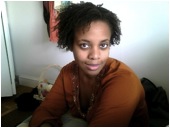 Chinyere Obimba is in her final year at Harvard Medical School. She was born and raised in Michigan, via Arkansas and Nigeria, where her parents are from originally. She loves languages, double-majoring in Spanish and Cellular and Molecular Biology in college, and recently learning Portugese. She is currently applying for residency in family medicine and hopes to focus her career on community health and maternal-child health, saving time to write and maybe dance a little samba on the side.
Chinyere Obimba is in her final year at Harvard Medical School. She was born and raised in Michigan, via Arkansas and Nigeria, where her parents are from originally. She loves languages, double-majoring in Spanish and Cellular and Molecular Biology in college, and recently learning Portugese. She is currently applying for residency in family medicine and hopes to focus her career on community health and maternal-child health, saving time to write and maybe dance a little samba on the side.“I was almost nineteen, a freshman, and barely Muslim when I met Sadiq. At least, I felt barely Muslim. After assimilating into the agnostic masses in high school in Ann Arbor, Michigan, I started practicing Islam again at the beginning of college. My foundation was the Islam I learned from my mother, a few of my aunts and uncles, and my grandparents, all of whom had converted to Islam years earlier, after being members of the Nation of Islam. As I learned more about my religion, I was attracted to its multicultural nature, as exemplified in the last sermon of the Prophet, peace be upon him. I fell in love with a faith that demanded that we transcend the limits of race and ethnicity.
I didn’t want to hide my faith any longer. I wanted to tell anyone who inquired that I was Muslim, but I was self-conscious about the fact that I did not have two Muslim parents and did not come from a “Muslim” culture. Even after I began rereading the Qur’an and started to resume the five daily prayers, I still didn’t feel Muslim enough in the company of the members of my college’s Muslim Student Association (MSA).”
To read the rest of Chinyere’s story, order Love, InshAllah today!
Why were you drawn to this project?
A friend of mine actually suggested this project to me because she knew I loved to write. When I first considered it, honestly, I looked at it as my first shot at being published, which was on my med school bucket list. After I wrote my first draft of the story, I recognized that the opportunity was greater than that. The story I tell came about precisely because I had no schema for courtship as a burgeoning Muslimah and had no access to other women’s stories because many of us shied away from talking about it with each other. I now see this as an excellent opportunity to break the silence on a topic that is really important to us, that stresses us out, that we place half of our religion on but that many of us go about in a lonely way.
What was the most challenging part of sharing your story?
The hardest part of sharing my story was being completely honest and not doing the subtle editing and censoring that I usually do around my Muslim friends and family. Bringing my attraction to the men in my story to life was hard for this reason. These were stories I didn’t tell my Muslim friends, at all, about myself…my non-Muslim friends, either, for that matter. So just putting the stories out there was a challenge, let alone being honest about controversial things, like considering a relationship with a non-Muslim man.
If there’s one thing you hope that readers will take away from your story, what is it?
I want readers, no matter their background, to take my story as an example of the diversity in our Muslim community, not just in terms of ethnicity, but upbringing and perspectives in practice.
Anything else you want to share?
I hope this anthology encourages constructive discourse in the Muslim community about gender relations and courtship paradigms for American Muslims, because in my experience, we could be doing a better job. This is not only for the health of future marriages between Muslims but also for our health as Muslims. We were created different genders and different peoples so that we learn to know each other, as God tells us in the Qur’an, and improving our gender relations will be part of us realizing that purpose.











